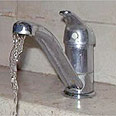
Middle East receives just 2% of world precipitation
Arabs say Israel drying up regional water reserves
In conference of water minister from Arab states, Jordanian representative accuses Israel of 'stealing water' in West Bank, Lebanon, and Golan; suggests international campaign to clarify Arabs' water rights
It has been said that the next Middle East war will be fought over water. While other reasons for conflict have come up since this sentence was first uttered, the water issue remains a potent one and will likely remain on the agenda for the foreseeable future.
The water shortage in the Middle East is a threat to all the countries in the region. The wealthy states, such as Saudi Arabia and the United Arab Emirates, found a solution in investing billions of dollars in water desalination plants.
The Middle East today is responsible for some 75% of the world's water desalination. However, the less wealthy countries in the region, without the deep pockets needed to fund the relatively pricey desalination, are in trouble.
In order to discuss the water crisis, water and irrigation ministers from the Arab states fathered in Cairo. Arab League Secretary General Amr Moussa also attended the conference. During the panels, an accusatory finger was directed at Israel for drying up its neighbors resources and "stealing Arab water."
In his speech before the conference, Jordanian Water and Irrigation Minister Mohammad Najjar called on his Arab colleagues to join hands and work together to grapple with the Israeli "thefts." According to him, Israel uses 80% of the water from the West Bank and 30% of Lebanon's groundwater. He claimed that Israel is stealing the water via the Golan.
Najjar highlighted the severity of the water situation in the region, noting that 70% of the region's water is not local. He also mentioned that precipitation in the region accounts for just 2% of precipitation in the world. He called upon his colleagues to launch an international campaign clarifying the Arabs' water rights.
The conference took place as assessments indicate rising demand for water in Arab countries in light of the rapid population growth and economic development they are witnessing. Studies published recently in the Arab world indicated that an investment of at least $100-200 billion in the Arab water sector over the next few years is necessary in order to meet t he steadily rising demand.
During regional water conferences held in recent months, experts have demanded that the governments cutback or halt all together their subsidization of water prices in order to decrease water consumption and waste.
Doron Peskin is head of research at Info-Prod Research (Middle East) Ltd.










